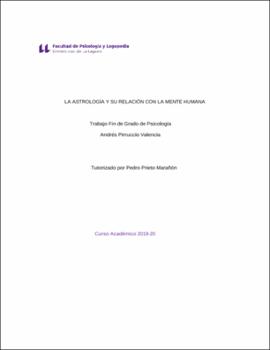La astrología y su relación con la mente humana
Date
2020Abstract
El objetivo del presente estudio es describir los rasgos de aquellos individuos que creen en la
astrología, aclarar si los signos zodiacales ejercen alguna influencia sobre las características
psicológicas y determinar también si el fenómeno conocido como profecía autocumplida ejerce
un efecto sobre el autoconcepto de los individuos que creen en astrología y conocen su respectivo
signo zodiacal. Para ello se ha contado con una muestra de 240 individuos (109 hombres y 131
mujeres). Los instrumentos empleados fueron el test BF-12 y NE-13GT para medir la
extraversión, el test NSP-13 para medir el afecto positivo y negativo y el test de creatividad para
medir el nivel de creatividad que se atribuían los participantes. Los resultados obtenidos muestran
que las mujeres tienden a creer más en la astrología que los hombres; los individuos que creen
en la astrología tienden a conocer mejor los rasgos de su respectivo signo zodiacal y, además,
tienden a ser más extrovertidos, creativos y proclives a manifestar emociones positivas. Los
sujetos con signo Leo resultaron ser más extrovertidos que el resto de los signos zodiacales,
mientras que los individuos con signo Capricornio no mostraron diferencias en cuanto a la
extraversión en comparación con el resto de los signos. En cuanto a la creatividad no se hallaron
diferencias significativas entre los signos. Por último, la creencia en astrología y el conocimiento
de las características del propio signo zodiacal no afectaron al autoconcepto. Así se concluye en
esta investigación que existen claras diferencias entre los individuos que creen y aquellos que no
creen en la astrología, que la relación entre los signos zodiacales y las características
psicológicas no es del todo clara y, finalmente, la creencia en astrología y el conocimiento del
signo zodiacal no ejerce ninguna influencia sobre las características psicológicas. The aim of the current study is to describe the traits of those individuals that believe in
astrology, to clarify if the zodiac signs have any influence on psychological characteristics and
determine as well if the phenomenon known as self-fulfilling prophecy exerts an effect over the
self-concept of those individuals that believe in astrology and know their respective zodiac sign.
For this, a sample of 240 individuals (109 men and 131 females) was used. The instruments
utilized for the investigation are the following: the BF-12 and NE-13GT tests to measure
extraversion, the NSP-13 test was used to measure Positive and Negative affect, and the creativity
test to measure the amount of creativity that the participants attributed to themselves. The results
show that women tend to believe more in astrology than men; those individuals that believe in
astrology tend to know better the traits that belong to their zodiac sign and, also, tend to be more
extroverted, more creative, and prone to exhibit more positive emotions. Subjects with a Leo sign
were more extraverted than the rest of signs, while those with a Capricorn sign were as extroverted
as the rest of signs. Regarding creativity, there were no statistical differences between the signs.
Lastly, belief in astrology and knowledge of those traits associated with the respective zodiac sign,
did not affect self-concept. Thus, we conclude in this investigation that there are plain differences
between those that believe and those that don’t believe in astrology, that the relationship between
psychological traits and zodiac signs isn’t clear and, finally, belief in astrology and knowledge of
the zodiac sign doesn’t exert any influence over psychological traits.





